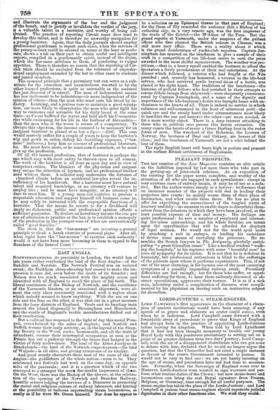PLEASANT PROSPECTS.
THE last number of the Law Magazine contains an able article on the liabilities imposed by law upon those who take part in the getting-up of joint-stock schemes. As an exposition of the existing law the paper seems complete, and worthy of the attention of all who are engaged in such speculations : except in' very extreme cases of railway mania, it may be of use as a seda- tive. But the author writes simply as a lawyer : he foresees that an immense number of the projects will end in leading their projectors into courts : he quietly warns them of their place of destination, and what awaits them there. He has no plan to offer for expediting the unravelment of the tangled yarns a knavery and folly—no measure to enable dupes to disenthral them- selves from the delusions in which they have been involved, at the least possible expense of time and money. His feelings are quite professional : he sees a number of perplexed and interest- ing law-pleas approachino. and his whole faculties are intent upon the opportunities gat will be afforded for displays of legal acumen. He would not for the world spoil sport by quashing a suit in embryo, or lending his assistance to devise some means of curtailing the processes. He re- sembles the Scotch lawyers in The Antiquary, gleefully antici- pating "a great Glenallan cause." Like a medical student "walk- ing the hospitals," in his raptures with some "beautiful case" he loses all sympathy for its victim. It is not that he is deficient in humanity, but professional enthusiasm is blind to the sufferings of the patients upon whom it performs experiments. This, if not one of the most alarming, is for laymen one of the most annoying symptoms of a possibly impending railway crash. Pecuniary difficulties are bad enough ; but for those who suffer, or appre- hend suffering for them, to hear them callously discussed as ab- stract speculations, aggravates their torture. It is as if a sick man, labouring under a complication of diseases, were compli- mented by his physician on leaving such an instructive subject for dissection.


























 Previous page
Previous page